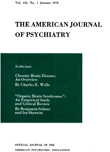A PSYCHOSOMATIC APPROACH TO THE PROBLEM OF STUTTERING IN PSYCHOTICS
Abstract
The study of 20 stuttering psychotic patients at the Central Islip State Hospital showed:
(a) One in every 350 psychotic patients or .28 percent, stuttered. (b) The psychiatric diagnosis was mainly schizoprenia. (c) Fifteen cases were of the introverted type and 5 cases of the extrovert variety. (d) The family history presented some degree of neuropsychiatric or psychosomatic disorder in every case except two where such information was not available. (e) The personality make-up of the majority of the patients appeared to be of a schizoid variety. (f) The physical examination presented no definite findings for establishing the etiological basis of stuttering. The neurological examination revealed no evidence of peripheral neuromuscular involvement or any pathology of the speech organs. (g) Nearly every case presented symptoms of acute or chronic anxiety. (h) The ages of onset of stuttering were recalled in 12 cases. These ranged from 5 to 8 years in 10 cases, beyond 10 years in 2 cases. (i) The ratio of males to females was 4 to 1. (j) Of the 20 patients examined 7 could attribute the symptom of stuttering to some specific happening. (k) In 9 cases there was a history of other stutterers in the family—in one instance stuttering was noted in the families of both parents. (l) Stuttering must be considered as a symptom of an underlying neurotic personality reaction. It is a complex syndrome and not due to any single etiological factor. Only through a psychosomatic approach can its nature be understood. (m) The difference between stuttering personalities in neurotics and psychotics is one of degree only.
Access content
To read the fulltext, please use one of the options below to sign in or purchase access.- Personal login
- Institutional Login
- Sign in via OpenAthens
- Register for access
-
Please login/register if you wish to pair your device and check access availability.
Not a subscriber?
PsychiatryOnline subscription options offer access to the DSM-5 library, books, journals, CME, and patient resources. This all-in-one virtual library provides psychiatrists and mental health professionals with key resources for diagnosis, treatment, research, and professional development.
Need more help? PsychiatryOnline Customer Service may be reached by emailing [email protected] or by calling 800-368-5777 (in the U.S.) or 703-907-7322 (outside the U.S.).



